Ancient Christian Treasure: Good Shepherd Ring Uncovered in Caesarea Shipwreck
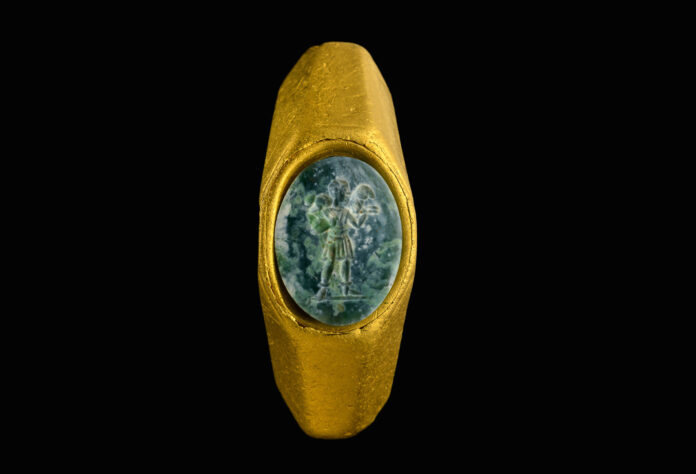
A remarkable discovery has emerged from the depths of the Mediterranean Sea near the ancient port of Caesarea, Israel. Archaeologists have uncovered a gold ring bearing an early Christian depiction of Jesus as a shepherd, alongside numerous other artifacts from centuries-old shipwrecks. This find offers a fascinating glimpse into the early Christian community and the maritime history of the region.
The Discovery
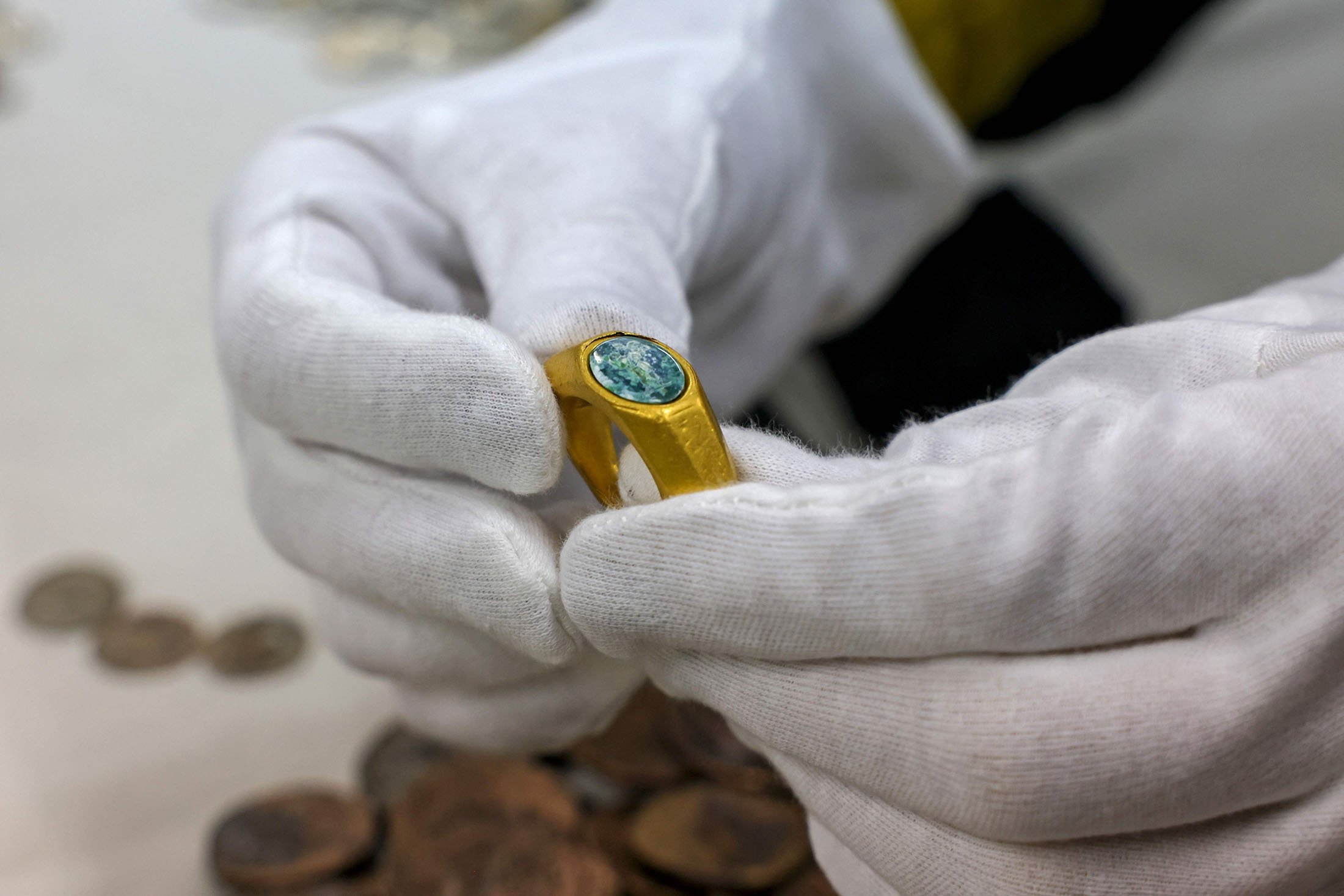
The Israel Antiquities Authority recently announced an extraordinary discovery: a gold ring adorned with a green gemstone. This gemstone is intricately engraved with the figure of a young boy carrying a ram or sheep on his shoulders, a depiction known as the Good Shepherd. This symbolic image is one of the earliest and most significant representations used by the Christian community in the East, symbolizing Jesus as the protector and caretaker of his followers.
Experts believe the ring dates back to the mid-third century. It was found alongside hundreds of silver and bronze coins scattered on the Mediterranean seabed near Caesarea, offering a rare and valuable insight into the region’s ancient past and its early Christian influences.
Significance of the Good Shepherd
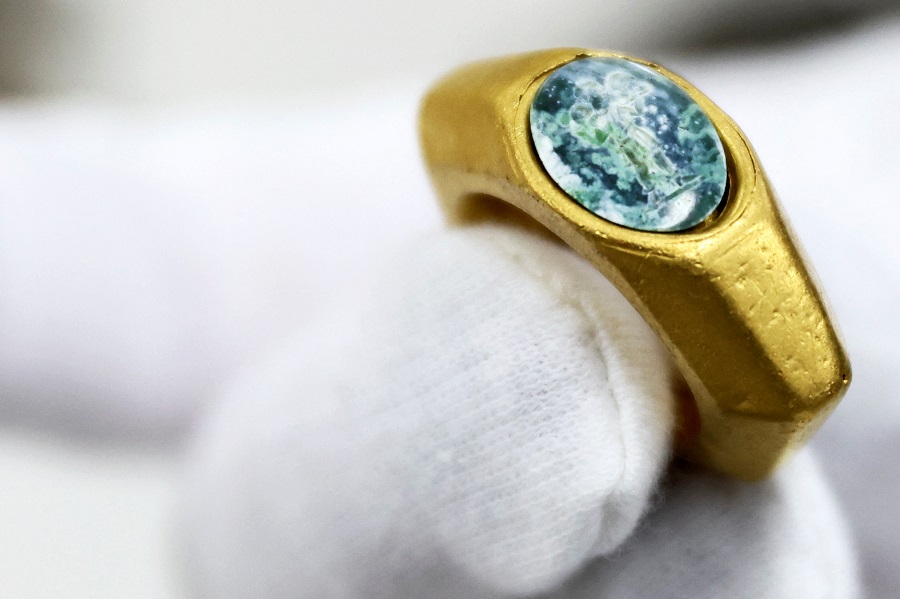
The Good Shepherd is a powerful and enduring symbol within early Christianity, deeply rooted in the teachings of Jesus. In the New Testament Book of John, Jesus explicitly refers to himself as the Good Shepherd, saying, “I am the good shepherd. The good shepherd lays down his life for the sheep” (John 10:11). This metaphor underscores Jesus’ commitment to protecting and caring for his followers, much like a shepherd tending to his flock.
For early Christians, this imagery was profoundly significant. It represented not only Jesus’ guidance and unwavering care but also his sacrificial love and dedication to their well-being. The Good Shepherd symbol thus served as a comforting and inspirational representation of Jesus’ role as the spiritual leader and guardian of the Christian community.
Additional Artifacts
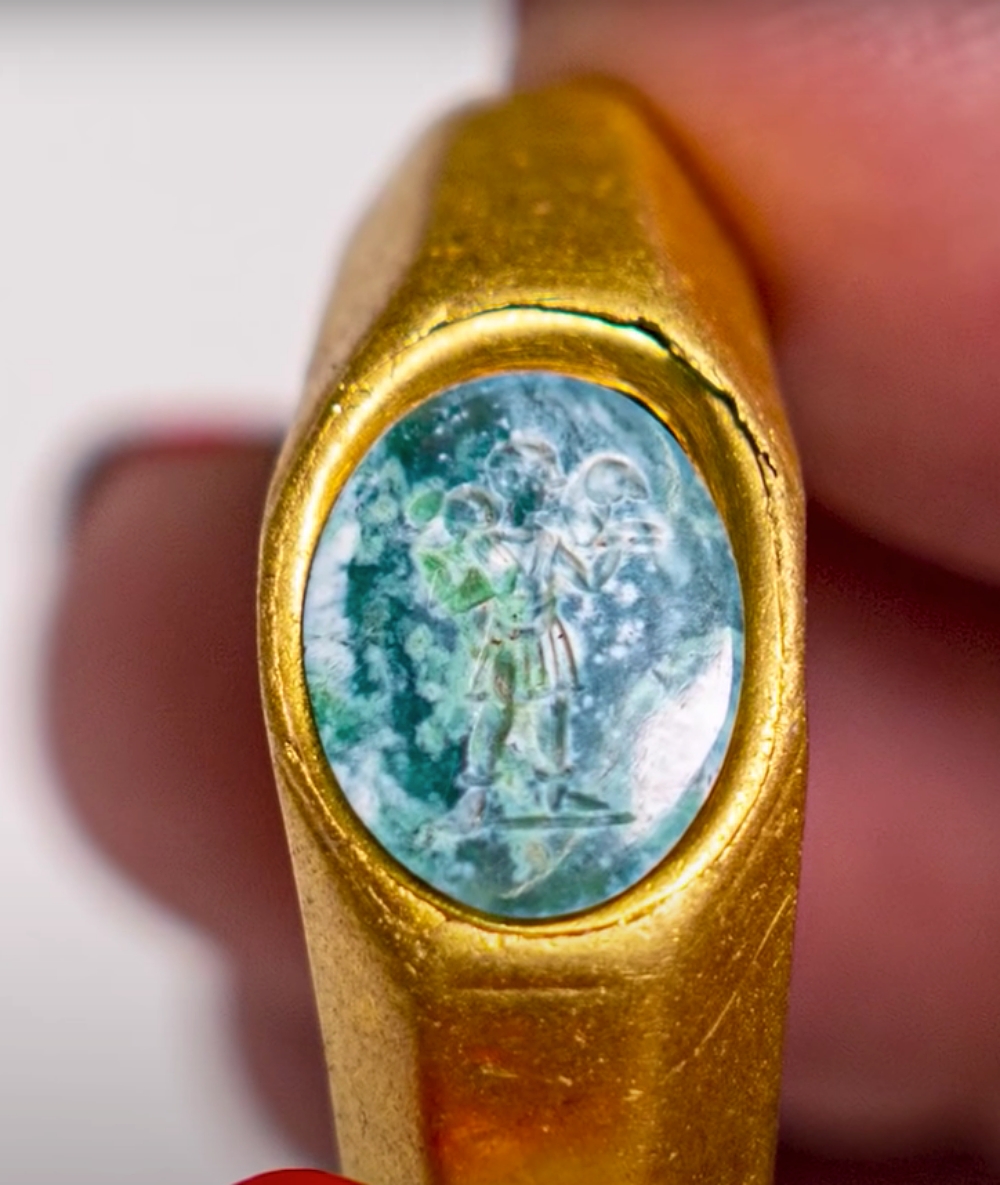
Alongside the remarkable Good Shepherd ring, the underwater excavation also unearthed a treasure trove of other significant artifacts. Among these were numerous Roman-era figurines, intricately crafted to depict various aspects of life and mythology from that period. Additionally, another striking find was a ring carved with the image of a biblical lyre, an instrument often associated with King David and symbolic of the rich musical traditions of ancient Israel.
These artifacts were discovered within the hulls of two ancient ships that had long been lost to the depths of the Mediterranean. The ships, which date back six and seventeen centuries respectively, are believed to have met their tragic fate during a violent storm while anchored near the ancient port of Caesarea. The storm likely overwhelmed the vessels, causing them to sink and their valuable cargo to scatter across the seabed.
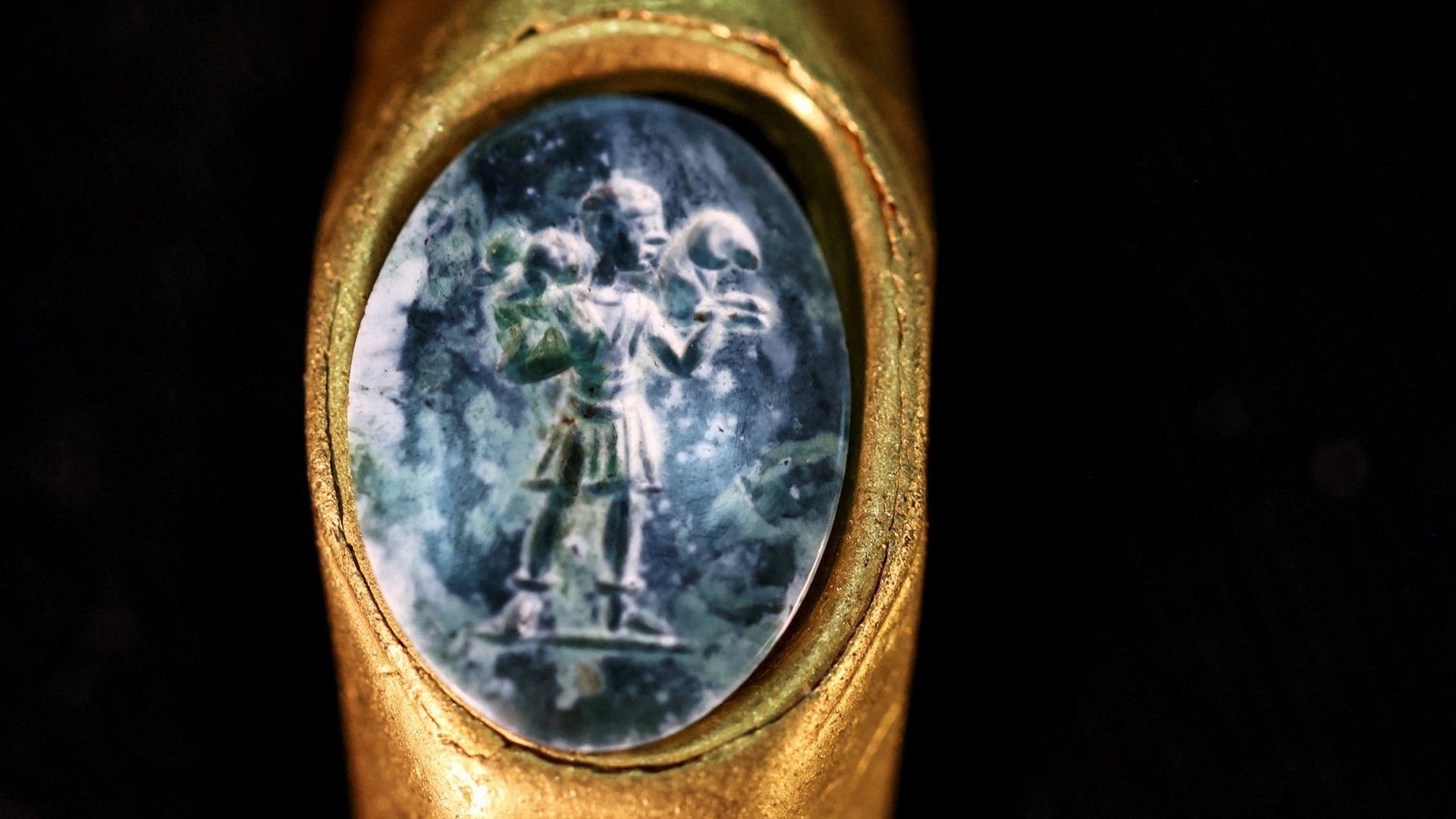
The recovery of these items provides a fascinating glimpse into the past, offering insights into the trade, culture, and early Christian symbolism of the region. The discovery of such well-preserved artifacts, including the Good Shepherd ring and the biblical lyre ring, highlights the historical significance of Caesarea as a bustling port and a center of early Christian activity.
Caesarea’s Historical and Religious Importance
Caesarea holds a prominent and revered place in early Christian history. This ancient port city is notably mentioned in the New Testament’s Acts of the Apostles, where it is recounted that the Apostle Peter baptized Cornelius, a Roman centurion, in Caesarea (Acts 10:1-48). This baptism is considered a pivotal event in the spread of Christianity, as Cornelius is often regarded as the first Gentile convert to Christianity, symbolizing the opening of the faith to non-Jewish communities.
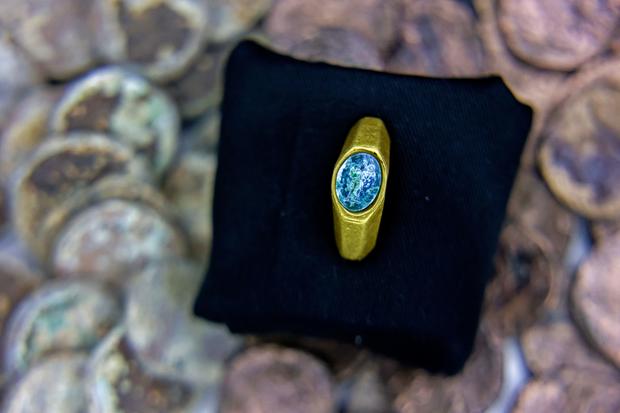
The significance of Caesarea extends beyond this single event. The city rapidly became one of the earliest and most influential centers of Christianity. It was home to one of the first established Christian communities, serving as a critical hub for early believers. The city’s strategic location along the Mediterranean coast facilitated the movement of people and ideas, contributing to the dissemination of Christian teachings across the region.
Moreover, Caesarea’s importance is underscored by its role in the development of early Christian theology and scholarship. It housed a renowned Christian library and was the seat of a major bishopric. The city attracted prominent Christian scholars and theologians, including Origen and Eusebius, who made significant contributions to Christian literature and historiography.
In summary, Caesarea’s rich historical and religious legacy as an early Christian center is evident through its mention in the New Testament, its role in the spread of Christianity, and its contributions to early Christian thought and community life. The city’s archaeological and historical records continue to offer valuable insights into the formative years of the Christian faith.
Conclusion
The recovery of the Good Shepherd ring and other ancient artifacts off the coast of Caesarea sheds light on the rich maritime history and the early Christian presence in the region. These discoveries not only provide valuable insights into the past but also reinforce the historical and religious significance of Caesarea as a pivotal site in early Christian history. As archaeologists continue to explore these underwater treasures, more stories from the ancient world are sure to emerge, further enriching our understanding of history.
Video
News
The Hanging Temple: China’s 1,500-Year-Old Cliffside Marvel of Faith and Engineering
The Hanging Temple: China’s 1,500-Year-Old Cliffside Marvel of Faith and Engineering Perched precariously on the cliffs of Mount Heng in Shanxi Province, China, the Hanging Temple, also known as Xuankong Temple, Hengshan Hanging Temple, or Hanging Monastery, is an architectural…
The Willendorf Venus: A 30,000-Year-Old Masterpiece Reveals Astonishing Secrets
The Willendorf Venus: A 30,000-Year-Old Masterpiece Reveals Astonishing Secrets The “Willendorf Venus” stands as one of the most revered archaeological treasures from the Upper Paleolithic era. Discovered in 1908 by scientist Johann Veran near Willendorf, Austria, this small yet profound…
Unveiling the Maya: Hallucinogens and Rituals Beneath the Yucatán Ball Courts
Unveiling the Maya: Hallucinogens and Rituals Beneath the Yucatán Ball Courts New archaeological research has uncovered intriguing insights into the ritual practices of the ancient Maya civilization. The focus of this study is a ceremonial offering found beneath the sediment…
Uncovering the Oldest Agricultural Machine: The Threshing Sledge’s Neolithic Origins
Uncovering the Oldest Agricultural Machine: The Threshing Sledge’s Neolithic Origins The history of agricultural innovation is a fascinating journey that spans thousands of years, and one of the earliest known agricultural machines is the threshing sledge. Recently, a groundbreaking study…
Nara’s Ancient Sword: A 1,600-Year-Old Protector Against Evil Spirits
Nara’s Ancient Sword: A 1,600-Year-Old Protector Against Evil Spirits In a remarkable discovery that has captured the attention of archaeologists and historians alike, a 7.5-foot-long iron sword was unearthed from a 1,600-year-old burial mound in Nara, Japan. This oversized weapon,…
The Inflatable Plane, Dropped Behind the Lines for Downed Pilots
Experimental The Inflatable Plane, Dropped Behind the Lines for Downed Pilots The Inflatoplane from Goodyear was an unconventional aircraft developed by the Goodyear Aircraft Company, a branch of the renowned Goodyear Tire and Rubber Company, also famed for the Goodyear…
End of content
No more pages to load











